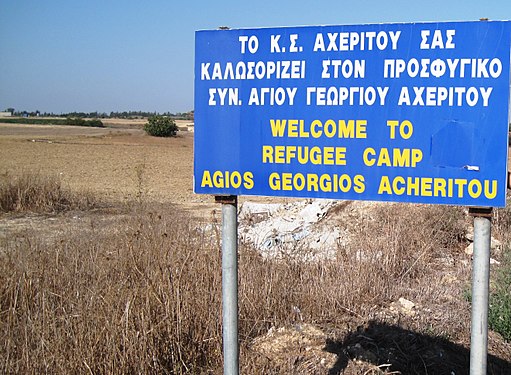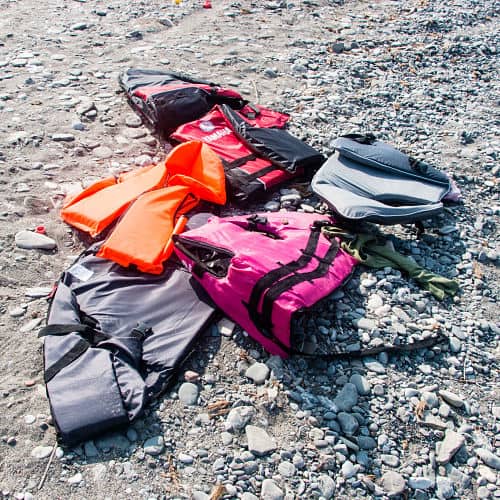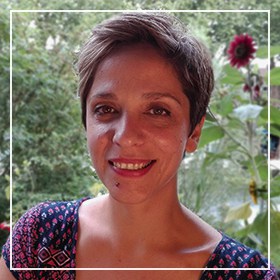Solidarity humanitarianism
Taking as a vantage point the blossoming humanitarian milieu that emerged as a response to the “refugee crisis” in Greece after 2015, I reflect on how forms of vernacular humanitarianisms – coined here as “solidarity humanitarianism” – challenge or transform established schemata of humanitarian action. Rather than providing an answer, I will here formulate the question on how a local idiom and mode of sociality is being translated in the framework of the “refugee crisis” and in reconfigurations of humanitarianism. Apart from large-scale, “traditional” humanitarian actors like international organizations, the solidarity movement, grassroots – and largely informal – groups, and independent volunteers are what exemplifies the humanitarian landscape in Greece since 2015.
“Solidarity humanitarianism” is a paradox, in the sense that participants in self-defined solidarity groups strongly differentiate themselves to large-scale and professional humanitarianism.
As I will show right away, this tension was dominant in Greece even before the “refugee crisis”. However, the humanitarian boom of the last years and the participation of diverse international actors challenges the previously clearly delineated distinction between solidarity and humanitarianism.
The overt antagonism of vernacular humanitarianisms to the formal humanitarian world is best captured through one term in Greek: the “allileggyos” (solidarian). The term solidarian itself is indicative of the culturally and historically informed ways that fuel contemporary solidarity humanitarianism and has a specific genealogy in the Greek context. The word itself is a neologism and an adjective that has turned into a noun. This grammatical shift and especially the diffusion of the term (which until recently was limited to the anarchist and leftist circles) signifies the radicalization of solidarity that took place in austerity-ridden Greece and resonates with native responses to fierce neoliberalization.[1]
Earlier, in the early 2000s (2002-2007) I did fieldwork in a small voluntary association in Athens. In particular I explored local resistances to the institutionalization and the professionalization of volunteerism that was taking place through fragmented legislations, subsidy channels, registries of voluntary associations and pedagogical procedures. Despite these top-down processes, volunteerism in Greece was considered “underdeveloped”. My research, however, challenged this widespread assumption and brought to the fore alternative forms of participation. As I argued, the neoliberal production of the volunteer as the new European and Greek citizen clearly clashed with local idioms of sociality that were grounded on the principles of horizontality and egalitarianism (Rozakou 2016a).
The volunteers who assisted refugees refused to accept any form of subsidies from the Greek state, the EU or private companies.
They resisted attending to training seminars and any supervision of their activities. More than providing aid through material goods or services, their intention was to engage in social relationships with the refugees they met and to subvert the dominant hierarchical schemata of humanitarianism.
In short, I then studied volunteers who objected the label “volunteer” itself and who contested the bureaucratization of their activities and its transformation into humanitarian assistance. They never considered the people they encountered in the streets as “beneficiaries” nor their activities as “services” or “humanitarian aid”. Theirs was an effort to engage in an egalitarian and lateral sociality with refugees and in relationships beyond gift-giving. These people contested the official humanitarian world, its bureaucratized principles, and modes of action. Both their motivations and the essence of their work was grounded on the principle of solidarity. Solidarity emphasizes lateral and anti-hierarchical relatedness. In this sense, it contrasts both hospitality (the dominant cultural code of dealing with alterity in Greece) and bureaucratic frameworks of assistance to immigrants and refugees distinctive of the humanitarian realm.
Lesvos: The emergence of a humanitarian field
In the summer of 2015 I was in Lesvos, conducting research about the bureaucratic procedures on the border. When I set off for my research (as part of a broader project on the deportation arena in Greece),[2] I never imagined how my new fieldwork site would lead me to old research paths.
From the study of benevolent volunteers who assisted refugees in Athens in the 2000s I had now turned to police officers who were assigned to the task of the registration and even the expulsion of illegalized border-crossers.
Nevertheless, my fieldwork in Lesvos (and in Athens) forced me to revisit some of my old ethnographic obsessions concerning the local manifestations of humanitarian assistance.

In July 2015 I walked amid tents, clothes that hung on ropes, and people who moved around a small hill that overlooked the Aegean Sea. On my way to the top of the hill I had passed by street vendors who sold overpriced tents, sleeping bags, shoes and snacks. I hesitantly approached some of the people who were sitting on the hot cement outside their tents and I was soon invited to join them. “What is it here? There is nothing here” a man from Aleppo told me, stretching his hand to the scenery of tents that comprised what became known as the “Kara Tepe (“Black Hill” in Turkish) camp”. For the greatest part of the summer of 2015 the Kara Tepe camp was not administered by any official authority. The plot had been allotted by the municipality to the Coast Guard in June 2015 but it was only a few weeks after its opening that the camp became overcrowded and the Coast Guard claimed that the place was beyond its jurisdiction and withdrew. In the summer of 2015 there were only a few international humanitarian organizations such as the MSF (Médecins Sans Frontières), MDM (Médécins du Monde) and IRC (International Rescue Committee), independent volunteers and solidarians offering first aid, medical assistance, information, food and water, cleaning and infrastructure facilities (such as tents, toilets and showers in the camps) on the island.
In July 2015 two men who stayed in the Kara Tepe camp died.
The lack of systematic medical or other assistance made the living conditions in the camp squalid. The Syrian man’s comment reflected the absence of an official and organized reception for the refugees. This was a recurrent theme in my discussions with the people I met during the summer. “Where is the state? The state is absent”.
In late October 2015, several months after my first visits to Kara Tepe there were already at least one hundred humanitarian organizations operating on Lesvos. The situation on the island was perceived as one of a humanitarian crisis that called for the intervention of experienced humanitarian actors.
This was the first time in history that an EU country had turned into the operation field for humanitarian organizations to that extent.
The UNHCR declared an emergency and the EU decided to allocate resources to humanitarian responses within its territory. At the same time, this was an uncomfortable remark uttered by many locals who objected to the transformation of their island into a “Third World” country and to the neocolonial attitude of international humanitarian actors. All over the island the vests of humanitarian workers and their logos colored public space and demarcated zones of operation, sociality and, ultimately, sovereignty over space. The recruitment of local staff was enormous and the investment in infrastructure and means of transportation sparkled a temporary boost in the local economy that had suffered from the austerity of the last years. Kara Tepe camp was being transformed into a model camp run by the municipality of Lesvos in cooperation with humanitarian organizations. Images such as the photo of the three-year old Aylan Kurdi lying dead in the Turkish shores sparkled the humanitarian impetus of laypeople who traveled from all over the world to Lesvos. At the same time, the social media emerged as a key “recipe” – in Thomas Haskell’s terms (1985), being both the source of information and the means of funding through crowds-funding – that enabled “independent volunteers” (another term that became central in the “refugee crisis”) to reach Greece.
In 2015 Lesvos became the epicenter of what is known as the “European refugee crisis” and at the same time, a symbol of extensive ad hoc support and solidarity with the refugees. In this island of 85,000 inhabitants, half million border-crossers were registered in that year; in fact, more than two thirds of the total arrivals to the country were recorded in Lesvos.[3] In the fall and winter of 2015 the coastline in the north was occupied by volunteers (Papataxiarchis 2016) and the rest of the island became the destination for unparalleled donations in the country (Rozakou 2016b). During the “refugee crisis”, the solidarians acquired a central role in organizing reception for border-crossers, in rescue operations, in providing services and goods and so forth. The notion of the “European refugee crisis” resonates with a deeply Eurocentric problématique. In fact, the “refugee crisis” is neither a new phenomenon and certainly not a European one, if one takes into account the grander presence of displaced populations in non-European territory. At the same time, the “asylum crisis” in Greece is not a novelty either and it had already been extensively documented (Cabot 2014).
More than the magnitude of the phenomenon itself, what was exceptional in this historical moment, was an emergent multifaceted humanitarian landscape.
This nexus comprised of diverse agents and constituted an unprecedented phenomenon for an EU country. Intergovernmental, international and national humanitarian organizations, local grassroots groups, local citizens, independent volunteers and solidarians worked together, formed unexpected coalitions, collaborated and often competed one another. And Lesvos became the focal point of reconfigurations of humanitarianism and the emergence of vernacular humanitarianisms.
In my encounters, I noticed that the exasperated question had also changed. It was no longer the state that was absent but the UNHCR. “Where is the UNHCR?” people would ask in frustration and in vain. This rhetorical question reflected a shift in authority and also in the conceptualization of the situation. The UNHCR was identified as the main agent that coordinated humanitarian organizations, cooperated with grassroots groups and was in direct collaboration with the local and national Greek authorities.
Later, when 60,000 migrants and refugees were stranded in Greece following the closure of the Balkan Road in the spring of 2016, settlements were impromptu set up in different parts of the Greek territory. A significant part of the EU financial assistance that aimed to “address the emergency humanitarian needs” was channeled to non-state actors within the framework of the European Asylum, Migration and Integration Fund (AMIF). Apart from formal humanitarian agents that were actively involved in the management of the refugee crisis, groups of solidarians took up and transformed public and private buildings into accommodation centers for refugees. Their rhetoric apparently challenges established humanitarian schemata and builds upon the local principles of solidarity socialities.
In their responses to the “refugee crisis” in Greece, grassroots solidarity initiatives were often overtly antagonistic to humanitarian organizations. Solidarians emphasized the disinterestedness of their endeavor and scrutinized the professionalism of humanitarian workers who merely worked on a 9-5 basis. The solidarians (a diverse group in the first place) encountered crucial dilemmas on whether they should cooperate with large-scale international organizations and receive funding from them. Some decided to make a step into institutionalization, to officially register as a non-profit organization and to host international independent volunteers. In a self-reflexive tone, solidarians themselves referred to the dangers of the “NGOification of solidarity”. And finally, the uneasy relationship between such groups and the centralized Greek state was manifested in instances of criminalization of solidarity and in attempts to normalize and regularize the humanitarian activities of grassroots and independent volunteers. In the case of the “European refugee crisis”, the challenges that solidarity humanitarianism poses to traditional schemata of humanitarianism illustrate an uncomfortable symbiosis of diverse and antagonistic actors.
The ways in which a historically informed idiom of sociality has attracted the attention of international volunteers are intriguing and worth special merit in future research.
Finally, in the last years solidarity has turned into an ideal and a quicksand for anthropologists and other social scientists. The abundance of researchers studying the humanitarian and solidarity milieu in Greece (should we distinguish between the two?) seem attracted by the moral and political resonances of the phenomenon or, rather, by the utopic visions that they resonate. This is certainly a crucial moment for engaged anthropological work (like many other fields with less publicity); yet the risks of self-assertiveness and a prevailing feeling of moral superiority are hard to ignore. Instead of interrogating the cultural content and the vernacular aspects of solidarity and humanitarianism, anthropologists run the risk of engaging into circular arguments with limited analytical or comparative validity. The question is not to examine the ideological purity of solidarity initiatives, but rather to capture changes in the contemporary humanitarian world.
References
Cabot, H., (2014), On the doorstep of Europe: Asylum and citizenship in Greece. Philadelphia: University of Pennsylvania Press.
Haskell, T. (1985) Capitalism and the Origins of the Humanitarian Sensibility. American Historical Review 90(2): 339-361.
Papataxiarchis, E., (2016), Being “there”: At the front line of the “European refugee crisis”—part 1 and part 2. Anthropology Today 32(2): 5–9 & 32(3): 3–7.
Rozakou, K., (2016a), “Crafting the volunteer: Voluntary association and the reformation of sociality”, Journal of Modern Greek Studies 34(1): 78–101.
Rozakou, K., (2016b), “Socialities of solidarity: Revisiting the gift taboo in times of crises”, Social Anthropology 24(2): 185–199.
[1] The flourishment of solidarity initiatives that has been recorded in ethnographic detail. See for example, the special issue on solidarity in Greece edited for Social Anthropology by Heath Cabot and Theodoros Rakopoulos in 2016 (volume 24, issue 2).
[2] Since 2014 I have been part of the research group studying “The Social Life of State Deportation Regimes: A Comparative Study of the Implementation Interface” of the University of Amsterdam. The project is funded by the European Research Council (Starting Grant 336319). For more information on our project: http://solidere.study/.
[3] http://reliefweb.int/sites/reliefweb.int/files/resources/Daily_Arrival_Greece_31122015.pdf (accessed 4/26/2017)
Featured image by Ann Wuyts (flickr, CC BY 2.0)





